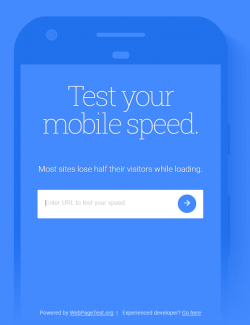We aim to respond to all messages within 1 business day. You'll be hearing from us soon!
In the meantime, perhaps you'd like to learn more...
Mobile Speed - Why It's Essential to Your Website's Success
A product of its own ‘success’, today’s internet is so freakishly instantaneous that the average user has an incredibly short attention span. So short in fact that Google has found over 50% of mobile site visitors leave a page if it takes more than three seconds to load. This means slow-loading mobile sites simply aren’t viable for companies who want to keep visitors engaged and achieve good conversion rates.
With Google pushing their mobile-first search index, that will eventually only crawl mobile-friendly websites, now is the time to take a serious look at your site’s speed and how responsive it is across all devices. Here at Apex Digital we are seasoned pros when it comes to optimising websites for speed and finding the right compromise between pleasing Google’s speed-testing tools, meeting budgets and creating a good browsing experience. We’d like to share with you why fast mobile speed is important, our approach, and Google’s new mobile site speed-testing tool.
Why Mobile-First is The Way Forward
In 2015 Google announced that more searches are performed on mobile devices than on desktop computers in ten countries, including the US and Japan. As such, their avid encouragement of mobile-friendly sites has come as no surprise and only intensified since then.
This is important for two reasons:
- While 75% of mobile sites take ten seconds or more to load, 53% of mobile site visitors leave after just three seconds of load time. The popularity of mobile browsing has accelerated at warp speed, but website owners and webmasters are struggling to adapt, and Google want to change that, pronto.
- Currently, two different Google search indexes (one for desktop and one for mobile) work alongside each other depending on what device is being used. However, Google are on track to drop the desktop
Google Are AMPing for Mobile
To help Google’s general push for a WWW that thrives on mobile, they’ve been promoting the Accelerated Mobile Pages or AMP Project. The open-source initiative aims to enable the “creation of websites and ads that are consistently fast, beautiful and high-performing across devices and distribution platforms.” AMP pages use a carefully calculated form of HTML and JavaScript, along with a dedicated Google cache to help them load quickly and work seamlessly on mobile.
It all sounds great in theory, but creating an AMP site requires a whole new framework (it is essentially an alternate version of a website) – a massive shift which can add a lot of cost and be hard to justify when good speed and ranking results can still be achieved without AMP. Another awkward point, as explored by Search Engine Watch, is that Google hosts the content which is an unusual position for a content publihser to be in as users are directed to a Google cached page rather than the actual website. We’re not jumping on the bandwagon just yet. Instead, we’re keeping a close eye on AMP and waiting for it be developed further and proven to be worthwhile for SMEs – and not just the early adopting large, high-content companies like eBay and Washington Post – before we start offering it to our clients.
Google’s New and Existing Site Speed-Testing Tools
Google recently dropped a new tool to test site speed on mobile devices. The tool analyzes the site and gives feedback on how to optimise it for mobile and how it compares to other sites. It differs from Google’s PageSpeed Insights tool (which tests both desktop and mobile performance), with its sole focus being on how sites work on mobile devices.
We’ve added the new tool to our speed testing repertoire, but a few shrewd observations below mean we don’t think it’s the holy grail in measuring mobile performance:
- Sites that score well on the PageSpeed Insights tool (and other 3rd party tools for that matter) and load quickly on mobile platforms, often receive very low scores on the new tool.
- It tests pages over a 3G network giving a negative impression of speed when in fact the faster 4G network is our more common network, with both Vodafone and Spark claiming their 4G serves well over half of the population.
- Instead of concentrating on ‘above the fold’ performance which leaves the unseen page content to load while mobile users ingest the initial view, results are based on complete page load time. This is despite the fact the ‘below the fold’ content doesn’t need to load nearly as quickly as content ‘above the fold’ because the user doesn’t retrieve it as quickly.
Keeping these points in mind, don’t panic if your site gets a seemingly bad score card on the tool, if it works well in real world mobile applications.

Google’s new tool tests a site's speed when it's viewed on mobile devices
How We Build Sites That Perform Well Across All Devices
When Apex Digital build or redesign a website, we strive to find a balance between client budget, user experience and site speed to achieve high conversion rates. This means that while we make use of Google (and other) tools that test speed on mobile (and desktop), we look at the results objectively and won’t rack up billable hours just to chase a 100% score, when the difference between 80% and 100% is likely unrecognisable by the end user and may in fact even harm their browsing satisfaction.
If you’re concerned your website isn’t keeping pace with Google’s push for mobile compatibility then contact us. We can help you catch the mobile-first wave, be visible for Google and speedy for browsers.
Written by Karyn Ogier
Here from the very beginning, Karyn was originally a co-founder of Apex Digital and carried the Strategy & Marketing Director title for more than two decades. Karyn switched gears at the end of 2018 when she returned to study in a new field. Now in a contract Content Writer capacity, she has a wealth of knowledge in the industry and has been...Related posts
AWESOME! LET'S GET STARTED
TELL US HOW WE CAN HELP
We aim to respond to all messages within 1 business day. You'll be hearing from us soon!
In the meantime, perhaps you'd like to learn more...






